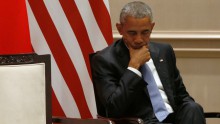Only three weeks are left before the inauguration of President-elect Donald Trump is held in the US. Thus, it is about time we can sum up the foreign policy of the past two terms, in which the Democrat Barack Obama, the first black American to occupy this position, has been the head of the state. The Day asked an American expert to name up to five achievements and failures of the White House’s leader during that period, and to forecast the possible changes in relations between Ukraine and the United States during the presidency of the Republican Donald Trump.
John HERBST, Director, Dinu Patriciu Eurasia Center, Atlantic Council, Washington, D.C.:
“Without a doubt the greatest achievement of Obama’s foreign policy was his nuclear deal with Iran. While it did not address the issue of Iran’s support for terrorism in the Middle East, it made it much harder for Iran to develop nuclear weapons.
“While perhaps overstated, Obama’s ‘pivot to Asia’ was an important recognition of the growing significance of the Pacific.
“Obama’s clearest failure was unsuccessful intervention in Libya. He removed the tyrant Qaddafi, and chaos ensued, not just in Libya, but in Mali; and Islamic extremists found large new territories in which to operate. This result was worse than Qaddafi.
“His second failure was his weak response to Russian aggression in Ukraine. He called this a regional crisis demanding a regional response. He never understood that Russia, the world’s second most powerful military power, was bent on changing the post Cold War security order and the war in Ukraine was one part of that. For that reason, the President limited our support for Ukraine – never providing the lethal defensive weapons that would impose higher costs on the Kremlin for its aggression and perhaps deter further aggression.
“His third failure is the one that currently receives the most attention. That is, President Obama’s failure to pacify Syria. To be fair to the President, this goal may be beyond American capabilities. President Bush failed in Iraq after he took down a strongman; Obama made the same mistake on a smaller scale in Libya; he did not want to repeat it in Syria. But he might have considered that before calling for Assad’s ouster, and he should never have made Assad’s use of chemical weapons a redline if he was not prepared to act. Finally, while it might be a mistake for the US to intervene to remove Assad, we could take the lead with our European allies and Arab friends in establishing a safe zone for internally displaced people in Syria. That would require American airpower, troops from our friends and allies, and the recognition that our interests demand and our power enables us to establish such a safe haven even if the Kremlin does not agree.
“Under President Obama, the key period of US-Ukraine relations began with the crisis that led to the departure of President Yanukovych and then Moscow’s war on Ukraine. In that period, relations have been basically good. The US have provided important support for Ukraine, but it should have provided more. On the reform side, the US provided billions of dollars of loan guarantees, but it should have provided billions of dollars of grant aid. Ukraine had to undertake painful reforms in wartime and it is in the national interests of the US that these reforms succeed.
“Vice President Biden deserves particular praise for encouraging an at times reluctant top leadership in Kyiv to propose and implement reform. On the war side, we passed strong sanctions against Russia and encouraged the EU to do the same. That was important; we also provided substantial military aid. But we were slow and timid in providing the military aid. It took over a year of fighting before we sent things like Humvees, and counter-battery radar for mortars and, eventually, counter-battery radar for missiles. But Obama was still unwilling to help Ukraine neutralize Moscow’s tank advantage by sending anti-tank missiles.
“Regarding the new Administration, it is too early to tell. While President-elect’s campaign statements about Ukraine were not encouraging, Vice President-elect Pence and most of the senior national security officials identified thus far understand the importance of supporting Ukraine against Kremlin aggression. In addition, both Republicans and Democrats in Congress are still strongly supportive of Ukraine. The one named national security official whose views on Russia and Ukraine are uncertain is Rex Tillerson. He is likely to face tough questioning during his Senate hearings.”








